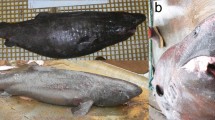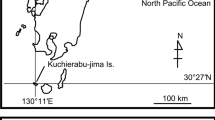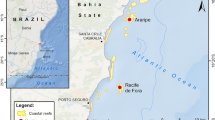Abstract
Ecotourism often is promoted as an ecologically sustainable activity, but some ecotourism activities negatively impact coastal ecosystems. Impacts of intensive diving tourism on coral reefs remain poorly understood, especially in the Florida Keys. We determined patterns of recreational dive frequency, diver behaviour, and coral damage on reefs near Key Largo, and assessed how pre-dive briefings and other factors affect these damage rates. Recreational divers contacted live stony corals ~ 18 times per scuba dive; most contacts deposited sediment onto corals, but also caused abrasion to coral tissues and fracture of coral skeletons. Divers who received pre-dive ecological briefings caused significantly less coral damage than those who did not, and divers with cameras and/or gloves caused the most damage. The proportion of damaged corals increased significantly with the estimated rate of recreational diving on each reef, and the percent cover of live corals decreased. We conclude that current rates of recreational diving in Key Largo are unsustainable, resulting in damage to >80 % of coral colonies and reduction of live coral cover to <11 % at heavily-dived sites. We recommend that dive tour operators administer pre-dive ecological briefings to all recreational divers, provide extra briefings to camera and glove users, and employ underwater dive guides who intervene when divers inadvertently damage live stony corals. This study provides a scientific basis to support management of intensive ecotourism on Florida coral reefs.





Similar content being viewed by others
References
Arin T, Kramer RA (2002) Divers’ willingness to pay to visit marine sanctuaries: an exploratory study. Ocean Coast Manage 45:171–183
Ball MM, Shinn EA, Stockman KW (1967) The geologic effects of hurricane Donna in South Florida. J Geol 75:583–597
Barker NHL, Roberts CM (2004) Scuba diver behaviour and the management of diving impacts on coral reefs. Biol Conserv 120:481–489
Camp E, Fraser D (2012) Influence of conservation education dive briefings as a management tool on the timing and nature of recreational SCUBA diving impacts on coral reefs. Ocean Coast Manage 61:30–37
Causey BD (2002) The role of the Florida Key National Marine Sanctuary in the South Florida Ecosystem Restoration Initiative. The Everglades, Florida Bay, and Coral Reefs of the Florida Keys: An ecosystem sourcebook, pp 883–894
Davis D, Tisdell C (1995) Recreational scuba-diving and carrying capacity in marine protected areas. Ocean Coast Manage 26:19–40
Dixon JA, Sherman PB (1991) Economics of protected areas: A new look at benefits and costs. Earthscan, London
Fitt WK, Brown BE, Warner ME, Dunne RP (2001) Coral bleaching: interpretation of thermal tolerance limits and thermal thresholds in tropical corals. Coral Reefs 20:51–65
Goldberg WM (1973) The ecology of the coral-octocoral communities off the southeast Florida coast: geomorphology, species composition, and zonation. B Mar Sci 23:465–488
Goreau TJ, Cervino J, Goreau M, Hayes R, Hayes M, Richardson L, Smith G, DeMeyer K, Nagelkerken I, Garzon-Ferrera J, Gil D, Garrison G, Williams EH, Bunkley-Williams L, Quirolo C, Patterson K, Porter JW, Porter K (1998) Rapid spread of disease in Caribbean coral reefs. Rev Biol Trop 5:157–171
Guzner B, Novplansky A, Chadwick NE (2010) Indirect impacts of recreational scuba diving: patterns of growth and predation in branching stony corals. B Mar Sci 86:727–742
Harriott VJ, Davis D, Banks SA (1997) Recreational diving and its impact in marine protected areas in Eastern Australia. Ambio 26:173–179
Hasler H, Ott JA (2008) Diving down the reefs? Intensive diving tourism threatens the reefs of the northern Red Sea. Mar Pollut Bull 56:1788–1794
Hawkins JP, Roberts CM (1992) Effects of recreational SCUBA diving on fore-reef slope communities of coral reefs. Biol Conserv 62:171–178
Hawkins JP, Roberts CM (1993) Effects of recreational SCUBA diving on coral reefs: trampling on reef-flat communities. J Appl Ecol 20:25–30
Hawkins JP, Roberts CM (1994) The growth of coastal tourism in the Red Sea: present and future effects on coral reefs. Ambio 23:503–508
Hawkins JP, Roberts CM, Hof TV, Meyer KD, Tratalos J, Aldam C (1999) Effects of recreational SCUBA diving on Caribbean coral and fish communities. Conserv Biol 13:888–897
Hodgson G (1999) A global assessment of human effects on coral reefs. Mar Pollut Bull 38:345–355
Honey M (1999) Ecotourism and sustainable development. Who owns paradise? 2nd edn. Island Press, Washington D.C
Humann P, Deloach N (2002) Reef coral identification, 2nd edn. New World Pub, Jacksonville
Kenchington RA (1993) Tourism in coastal and marine environments—a recreational perspective. Ocean Coast Manage 19:1–16
Leeworthy VR, Morris FC (2010) A socioeconomic analysis of the recreation activities of Monroe County residents in the Florida Keys/Key West 2008. Office of National Marine Sanctuaries, National Ocean Service, National Oceanic and Atmospheric Administration, Silver Spring, Maryland
Medio D, Ormond RFG, Pearson M (1997) Effect of briefings on rates of damage to corals by SCUBA divers. Biol Conserv 79:91–95
Morrow KM, Paul VJ, Liles MR, Chadwick NE (2011) Alleochemicals produced by Caribbean macroalgae and cyanobacteria have species-specific effects on reef coral microorganisms. Coral Reefs 30:309–320
NOAA (2007) Florida Keys National Marine Sanctuary revised management plan. U.S. Department of Commerce, National Oceanic and Atmospheric Administration, National Ocean Service, Silver Spring, Maryland
Pendleton LH (1994) Environmental quality and recreational demand in a Caribbean coral reef. Coast Manage 22:399–404
Plathong S, Inglis GJ, Huber ME (2000) Effects of self-guided snorkeling trails on corals in a tropical marine park. Conserv Biol 14:1821–1830
Rosenberg E, Koren O, Reshef L, Efrony R, Zilber-Rosenberg I (2007) The role of microorganisms in coral health, disease and evolution. Nat Rev Microbiol 5:355–362
Rouphael AB, Inglis GJ (1997) Impacts of recreational SCUBA diving at sites with different reef topographies. Biol Conserv 82:329–336
Rouphael AB, Inglis GJ (2001) “Take only photographs and leave only footprints”?: an experimental study of the impacts of underwater photographers on coral reef dive sites. Biol Conserv 100:281–287
Schuhmann P, Casey J, Oxenford HA (2008) The value of coral quality to SCUBA divers in Barbados. In Proceedings of the 11th International Coral Reef Symposium 1:7–11
Talge H (1992) Impact of recreational divers on scleractinian corals at Looe Key, Florida. Proceedings of the Seventh International Coral Reef Symposium 2:1077–1082
Tilmant JT, Schmahl GP (1981) A comparative analysis of coral damage on recreationally used reefs within Biscayne National Park, Florida. Proceedings of the Fourth International Coral Reef Symposium 1:187–192
Tuohino A, Hynonen A (2001) Ecotourism: Imagery and reality: Reflections on concepts and practices in Finnish rural tourism. Nordia Geographical Publications 30:21–34
Uyarra MC, Cote IM (2007) The quest for cryptic creatures: impacts of species-focused recreational diving on corals. Biol Conserv 136:77–84
Vernon JEN (2000) Corals of the world. Australian Institute of Marine Science, Townsville
Wielgus J, Chadwick-Furman NE, Dubinsky Z, Schechter M, Zeitouni N (2002) Dose–response modeling of recreationally important coral-reef attributes: a review and potential application to the economic valuation of damage. Coral Reefs 21:253–259
Wight PA (1993) Ecotourism: ethics or eco-sell. J Travel Res 31:3–9
Williams DE (2008) Recruitment failure in Florida Keys Acropora palmata, a threatened Caribbean coral. Coral Reefs 27:697–705
Zakai D, Chadwick-Furman NE (2002) Impacts of intensive recreational diving on reef corals at Eilat, northern Red Sea. Biol Conserv 105:179–187
Acknowledgments
We thank Joey Szczebak, Stanton Belford, and David Weese for assistance in the field, and William Fitt (University of Georgia) for the use of the Key Largo Marine Research Laboratory. This research was submitted in partial fulfilment of the requirements for an M.Sc. degree to JRK from Auburn University, and was funded in part by a Graduate Research Grant from Auburn University to JRK. This study was conducted in accordance with the marine sanctuary collection protocols of NOAA, under permit # FKNMS-2011-037. This is publication #XXX of the Auburn University Marine Biology Program.
Author information
Authors and Affiliations
Corresponding author
Rights and permissions
About this article
Cite this article
Krieger, J.R., Chadwick, N.E. Recreational diving impacts and the use of pre-dive briefings as a management strategy on Florida coral reefs. J Coast Conserv 17, 179–189 (2013). https://doi.org/10.1007/s11852-012-0229-9
Received:
Revised:
Accepted:
Published:
Issue Date:
DOI: https://doi.org/10.1007/s11852-012-0229-9




